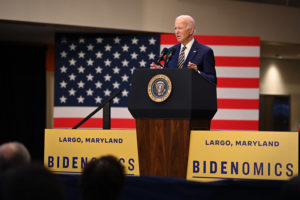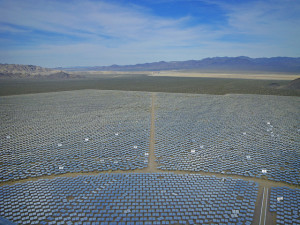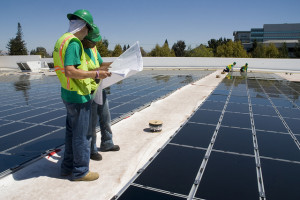
President Biden touts “Bidenomics” in Maryland
There is a strange disconnect happening in the country, between actual economic realities and people’s perception of the economy. As to the former, many of the numbers today and during President Joe Biden‘s administration are stunningly good, including solid economic growth, record job creation and low unemployment, wage growth, rebuilding our infrastructure, $160 billion in student loan forgiveness so far, and a stock market that just hit a record 40,000, causing millions of Americans’ retirement accounts to grow. Even as to persistent inflation, which began after the U.S. economy shut down during the 2020 Trump Recession, it has been heading in the right direction (steadily down), in part thanks to efforts by President Biden and the Democrats. Those efforts include passing the Inflation Reduction Act, which, among other things, capped insulin for Medicare recipients at $35 per month and extended tax credits for electric vehicles and residential and commercial solar energy installations. Moreover, record oil production under President Biden helps keep gasoline prices down.
At the same time, however, we keep hearing stories that, as Voice of America reported last January:
Despite those robust numbers, most Americans, 68%, say the economy is worsening, according to a December 2023 Gallup poll, which showed that four in five U.S. adults rate the country’s current economic conditions as “poor” (45%) or “fair” (33%). Only 19% of people polled said the economy is “good,” in keeping with the positive economic markers.
Again, somewhat oddly, the same VOA article reported:
However, Justin Wolfers, a professor of public policy and economics at the University of Michigan, questions the accuracy of polls and says people’s actions suggest they believe the economy is doing well.
“How would we figure out if the American consumer were in fact optimistic? I think the first thing you do is you look at consumption spending, because if you expect the economy to be terrible, you’d squirrel away money for this coming recession,” Wolfers said. “But instead, people have been spending money as if they believe, not only is the economy good, it’s going to continue to be good.”
Given these mixed signals at best on the economy, the Biden administration and leading Democrats likely need to do a better job communicating good news. However, it’s tough for President Biden and the Democrats to get proper credit for the success of “Bidenomics” when we have mainstream media headlines like this one from Yahoo! Finance last Wednesday:
“Grocery prices jumped 1.2% last month as food inflation returns to pre-pandemic levels.”
What a confusing and misleading headline. First, as the video and text accompanying the article indicate, grocery prices didn’t “jump” last month, they “dropped 0.2%” from the previous month (emphasis added). Second, if the relevant measure is year to year, again the video included in the article indicates that grocery prices increased 1.1 percent, not 1.2 percent. Third, as is indicated later in the text, this small increase reflects very low inflation. Grocery prices are moderating, and are now increasing well below the overall inflation rate. Indeed, the “pre-pandemic levels” part of the Yahoo! Finance headline means before the last round of inflation hit, i.e., when inflation was in the two percent range.
No one likes inflation, but what a poor job of journalism in the headline and lede of this particular story. Sadly, that is the kind of sloppy or biased reporting that occurs too much in our media. Likewise, when media outlets report good economic news, and then, often in the same sentence, state that President Biden isn’t receiving proper credit for the good economy, the outlets are perpetuating the problem.
How do we combat this kind of reporting? At minimum, we have to call it out and correct it, far and wide.
Photo by Maryland GovPics, used under Creative Commons license. https://is.gd/so9TcZ








